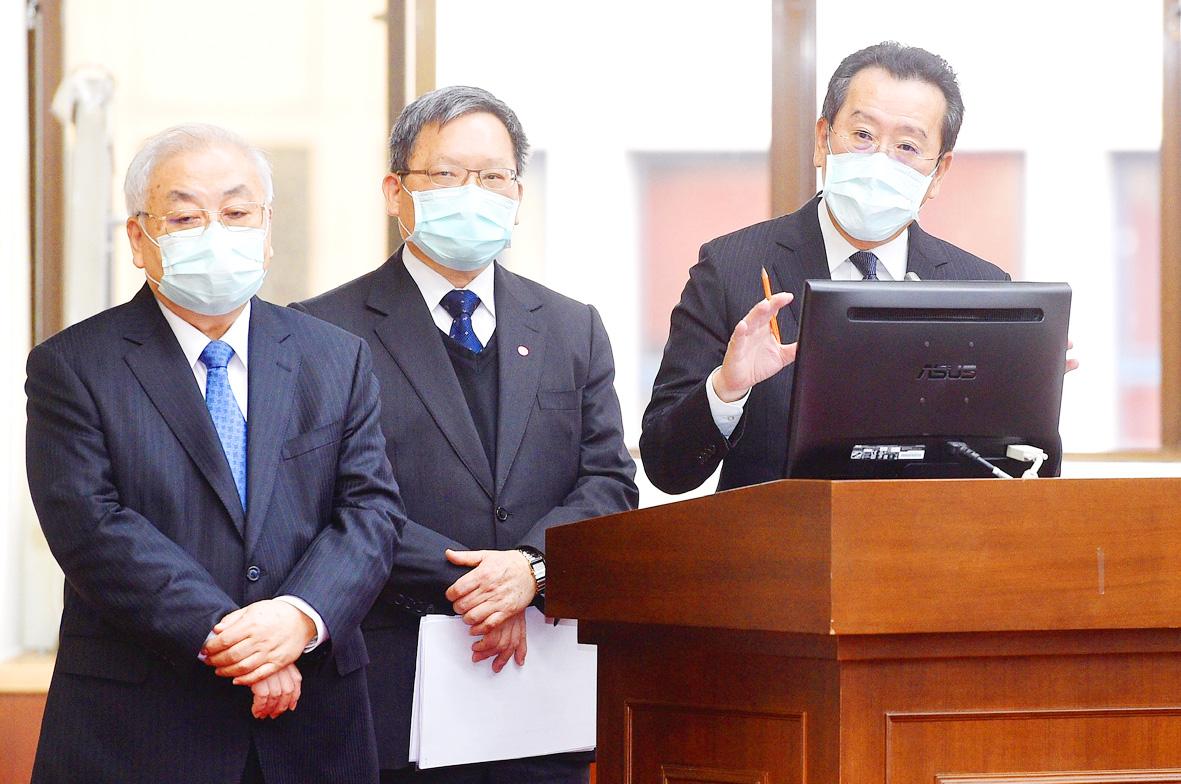Local banks had approved 5,056 loan applications totaling NT$81.6 billion (US$2.72 billion) for businesses affected by the COVID-19 pandemic as of Wednesday last week, surging from 510 applications totaling NT$7.39 billion two weeks earlier, Financial Supervisory Commission (FSC) data showed yesterday.
Eighty-seven percent of the loans, or 4,177 applications for NT$71.7 billion, were provided by state-run banks, for an average of NT$17 million per application, the data showed.
Private banks lent NT$9.9 billion to 879 firms, for an average of NT$11 million per application, data showed.

Photo: George Tsorng, Taipei Times
“It seems that the government did not have a strong incentive to encourage private banks to help affected businesses,” Chinese Nationalist Party (KMT) Legislator William Tseng (曾銘宗) told a meeting of the legislature’s Finance Committee in Taipei.
The approved loans represented a tiny fraction of the nation’s total lending of NT$6.9 trillion to small and medium-sized enterprises (SMEs), Tseng said.
The lending does not appear significant, as the government’s relief program aims to support SMEs, commission Chairman Wellington Koo (顧立雄) said.
The commission would review its incentives for private banks to approve more loans for businesses affected by the pandemic, Koo said, adding that the government would cover most risks.
The Small and Medium Enterprise Credit Guarantee Fund of Taiwan offers credit guarantees of 80 to 90 percent, or even full guarantees, for small-scale firms, he said.
Separately, the FSC would not lift a ban on short selling on the Taiwan Stock Exchange and the Taipei Exchange, even though the local equity market has recovered, Koo said.
The commission first needs to evaluate whether the pandemic has been brought under control in Europe and the US, as the local market is highly sensitive to foreign equity markets, he said.
The regulator announced the ban in the middle of last month to curb speculative trading amid “irrational declines” on the stock market.

In Italy’s storied gold-making hubs, jewelers are reworking their designs to trim gold content as they race to blunt the effect of record prices and appeal to shoppers watching their budgets. Gold prices hit a record high on Thursday, surging near US$5,600 an ounce, more than double a year ago as geopolitical concerns and jitters over trade pushed investors toward the safe-haven asset. The rally is putting undue pressure on small artisans as they face mounting demands from customers, including international brands, to produce cheaper items, from signature pieces to wedding rings, according to interviews with four independent jewelers in Italy’s main

Japanese Prime Minister Sanae Takaichi has talked up the benefits of a weaker yen in a campaign speech, adopting a tone at odds with her finance ministry, which has refused to rule out any options to counter excessive foreign exchange volatility. Takaichi later softened her stance, saying she did not have a preference for the yen’s direction. “People say the weak yen is bad right now, but for export industries, it’s a major opportunity,” Takaichi said on Saturday at a rally for Liberal Democratic Party candidate Daishiro Yamagiwa in Kanagawa Prefecture ahead of a snap election on Sunday. “Whether it’s selling food or

CONCERNS: Tech companies investing in AI businesses that purchase their products have raised questions among investors that they are artificially propping up demand Nvidia Corp chief executive officer Jensen Huang (黃仁勳) on Saturday said that the company would be participating in OpenAI’s latest funding round, describing it as potentially “the largest investment we’ve ever made.” “We will invest a great deal of money,” Huang told reporters while visiting Taipei. “I believe in OpenAI. The work that they do is incredible. They’re one of the most consequential companies of our time.” Huang did not say exactly how much Nvidia might contribute, but described the investment as “huge.” “Let Sam announce how much he’s going to raise — it’s for him to decide,” Huang said, referring to OpenAI

Nvidia Corp’s negotiations to invest as much as US$100 billion in OpenAI have broken down, the Wall Street Journal (WSJ) reported, exposing a potential rift between two of the most powerful companies in the artificial intelligence (AI) industry. The discussions stalled after some inside Nvidia expressed concerns about the transaction, the WSJ reported, citing unidentified people familiar with the deliberations. OpenAI makes the popular chatbot ChatGPT, while Nvidia dominates the market for AI processors that help develop such software. The companies announced the agreement in September last year, saying at the time that they had signed a letter of intent for a strategic